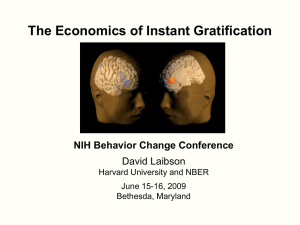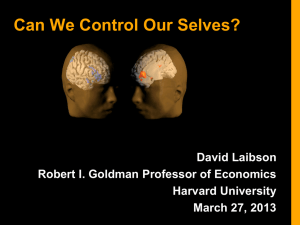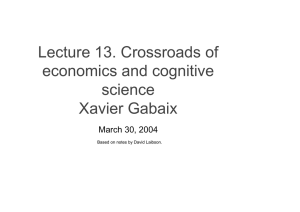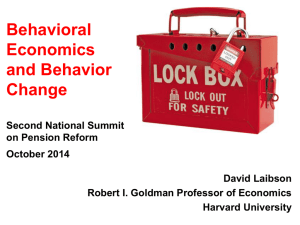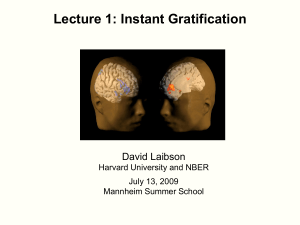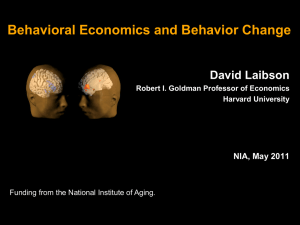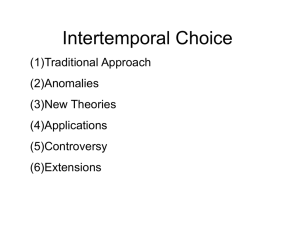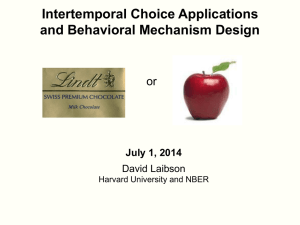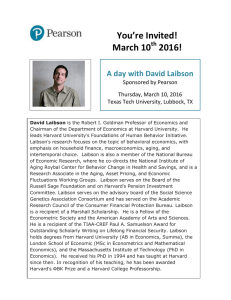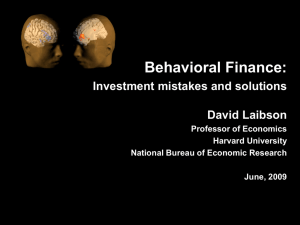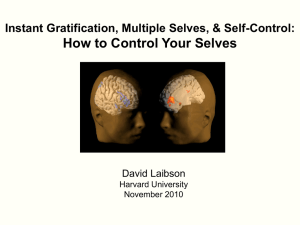David Laibson RAND Summer 2006
advertisement
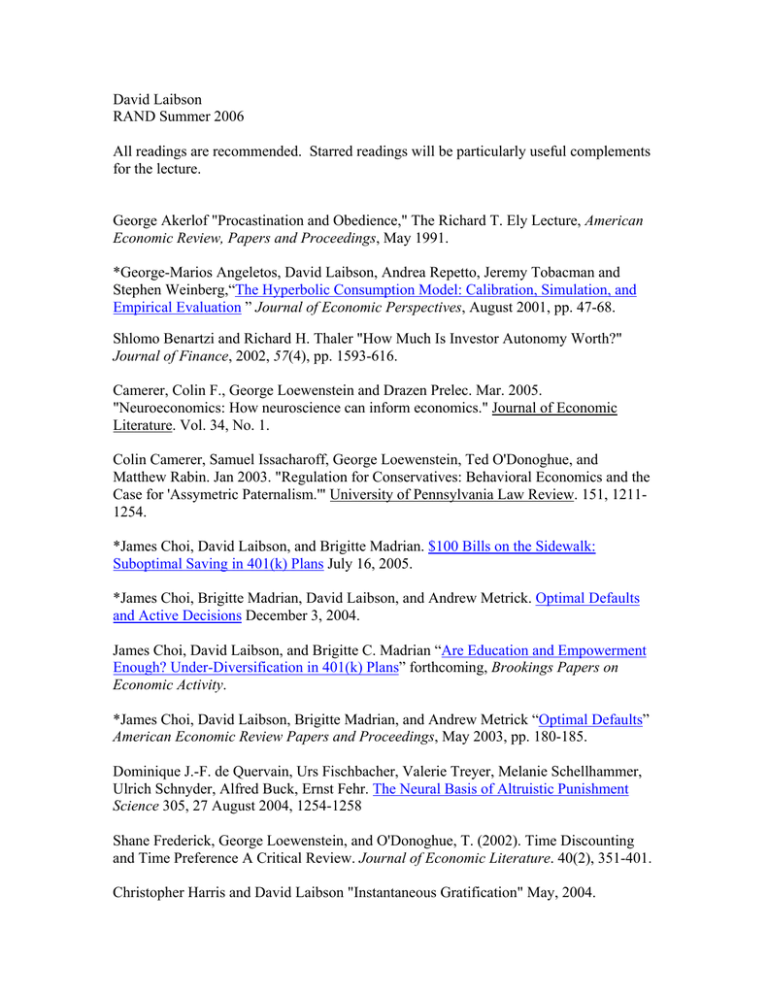
David Laibson RAND Summer 2006 All readings are recommended. Starred readings will be particularly useful complements for the lecture. George Akerlof "Procastination and Obedience," The Richard T. Ely Lecture, American Economic Review, Papers and Proceedings, May 1991. *George-Marios Angeletos, David Laibson, Andrea Repetto, Jeremy Tobacman and Stephen Weinberg,“The Hyperbolic Consumption Model: Calibration, Simulation, and Empirical Evaluation ” Journal of Economic Perspectives, August 2001, pp. 47-68. Shlomo Benartzi and Richard H. Thaler "How Much Is Investor Autonomy Worth?" Journal of Finance, 2002, 57(4), pp. 1593-616. Camerer, Colin F., George Loewenstein and Drazen Prelec. Mar. 2005. "Neuroeconomics: How neuroscience can inform economics." Journal of Economic Literature. Vol. 34, No. 1. Colin Camerer, Samuel Issacharoff, George Loewenstein, Ted O'Donoghue, and Matthew Rabin. Jan 2003. "Regulation for Conservatives: Behavioral Economics and the Case for 'Assymetric Paternalism.'" University of Pennsylvania Law Review. 151, 12111254. *James Choi, David Laibson, and Brigitte Madrian. $100 Bills on the Sidewalk: Suboptimal Saving in 401(k) Plans July 16, 2005. *James Choi, Brigitte Madrian, David Laibson, and Andrew Metrick. Optimal Defaults and Active Decisions December 3, 2004. James Choi, David Laibson, and Brigitte C. Madrian “Are Education and Empowerment Enough? Under-Diversification in 401(k) Plans” forthcoming, Brookings Papers on Economic Activity. *James Choi, David Laibson, Brigitte Madrian, and Andrew Metrick “Optimal Defaults” American Economic Review Papers and Proceedings, May 2003, pp. 180-185. Dominique J.-F. de Quervain, Urs Fischbacher, Valerie Treyer, Melanie Schellhammer, Ulrich Schnyder, Alfred Buck, Ernst Fehr. The Neural Basis of Altruistic Punishment Science 305, 27 August 2004, 1254-1258 Shane Frederick, George Loewenstein, and O'Donoghue, T. (2002). Time Discounting and Time Preference A Critical Review. Journal of Economic Literature. 40(2), 351-401. Christopher Harris and David Laibson "Instantaneous Gratification" May, 2004. *David Laibson, “Golden Eggs and Hyperbolic Discounting,” Quarterly Journal of Economics, 62, May 1997, 443-77. David Laibson, “A Cue-Theory of Consumption,” Quarterly Journal of Economics, 66(1), February 2001, pp. 81-120. *David Laibson, Andrea Repetto, and Jeremy Tobacman. Estimating Discount Functions with Consumption Choices over the Lifecycle, 2005. George Loewenstein, & Richard Thaler (1989). “Anomalies: Intertemporal choice.” Journal of Economic Perspectives, 3, 181-193. *Samuel M. McClure, David Laibson, George Loewenstein, Jonathan D. Cohen “Separate Neural Systems Value Immediate and Delayed Monetary Rewards,” Science 306, October 15, 2004. Ted O'Donoghue and Matthew Rabin, "Doing It Now or Later" American Economic Review 89(1), 103-124, March 1999. Ted O’Donoghue and Matthew Rabin, "Optimal Sin Taxes" Journal of Public Economics, forthcoming. Daniel Read, George Loewenstein, and Kalyanaraman, S. (1999). Mixing virtue and vice: The combined effects of hyperbolic discounting and diversification. Journal of Behavioral Decision Making, 12, 257-73. Cass R Sunstein and Richard H Thaler "Libertarian Paternalism Is Not an Oxymoron." University of Chicago Law Review, 2003, 70(4), pp. 1159. Richard H. Thaler and Shlomo Benartzi "Save More Tomorrow(™): Using Behavioral Economics to Increase Employee Saving." Journal of Political Economy, 2004, 112(1), pp. S164.
